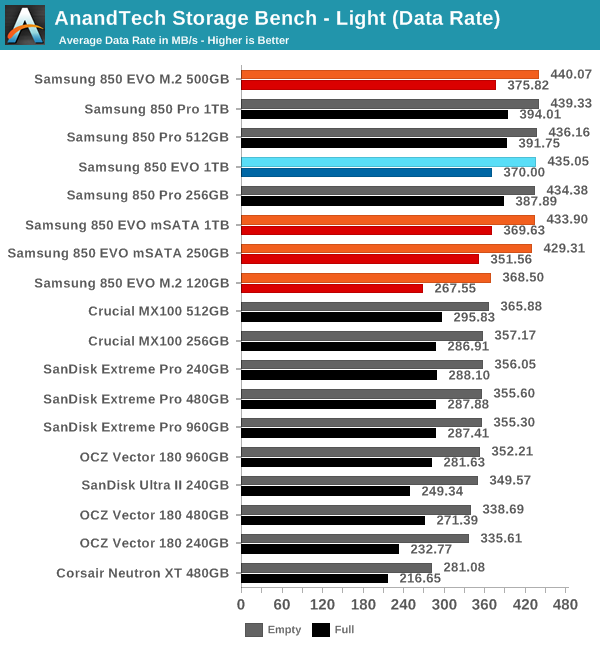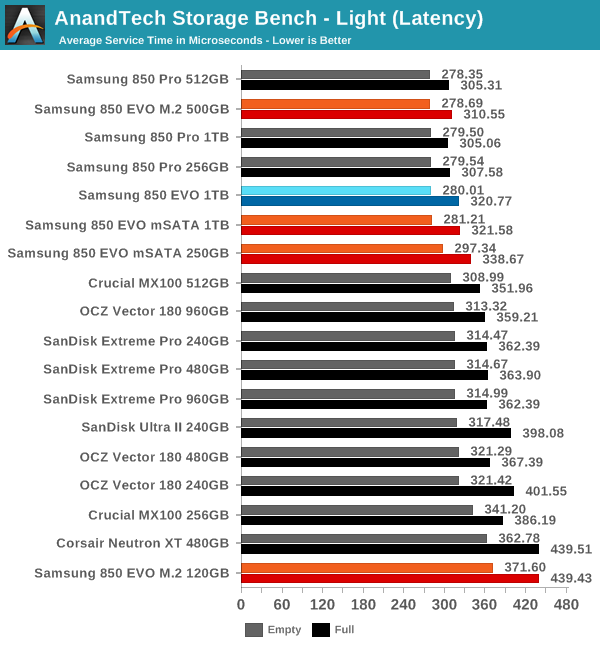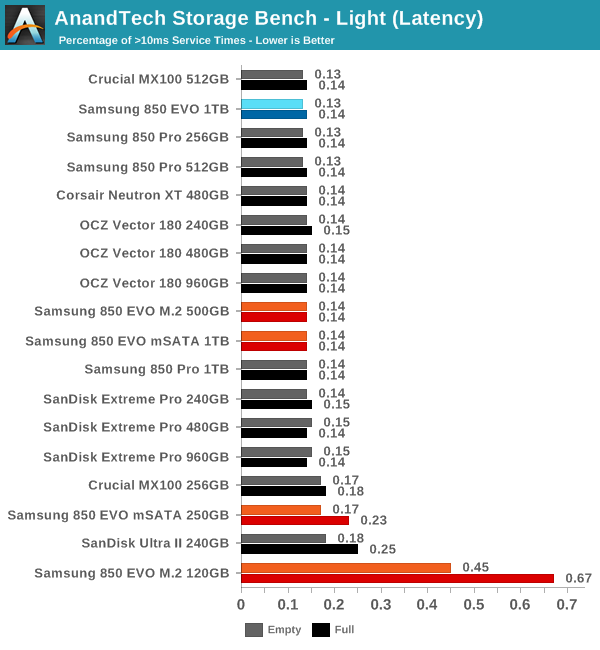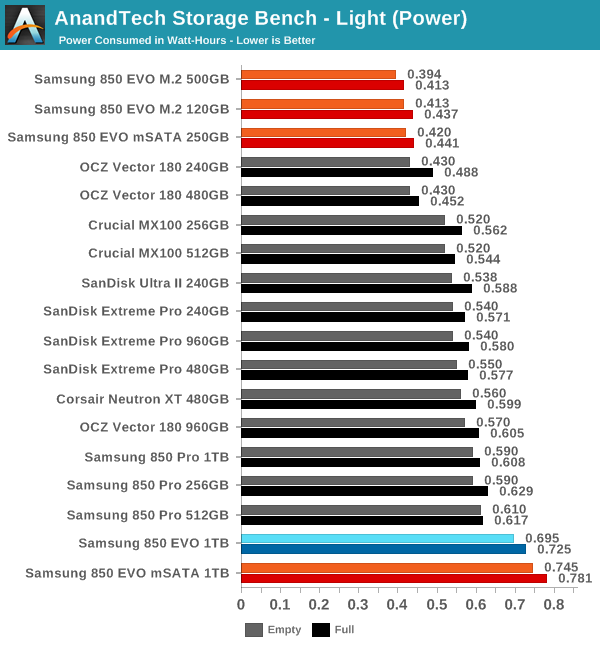The Samsung SSD 850 EVO mSATA/M.2 Review
by Kristian Vättö on March 31, 2015 10:00 AM ESTAnandTech Storage Bench - Light
The Light trace is designed to be an accurate illustration of basic usage. It's basically a subset of the Heavy trace, but we've left out some workloads to reduce the writes and make it more read intensive in general.
| AnandTech Storage Bench - Light - Specs | ||||||||||||
| Reads | 372,630 | |||||||||||
| Writes | 459,709 | |||||||||||
| Total IO Operations | 832,339 | |||||||||||
| Total GB Read | 17.97 GB | |||||||||||
| Total GB Written | 23.25 GB | |||||||||||
| Average Queue Depth | ~4.6 | |||||||||||
| Focus | Basic, light IO usage | |||||||||||
The Light trace still has more writes than reads, but a very light workload would be even more read-centric (think web browsing, document editing, etc). It has about 23GB of writes, which would account for roughly two or three days of average usage (i.e. 7-11GB per day).
| AnandTech Storage Bench - Light - IO Breakdown | |||||||||||
| IO Size | <4KB | 4KB | 8KB | 16KB | 32KB | 64KB | 128KB | ||||
| % of Total | 6.2% | 27.6% | 2.4% | 8.0% | 6.5% | 4.8% | 26.4% | ||||
The IO distribution of the Light trace is very similar to the Heavy trace with slightly more IOs being 128KB. About 70% of the IOs are sequential, though, so that is a major difference compared to the Heavy trace.
| AnandTech Storage Bench - Light - QD Breakdown | ||||||||||||
| Queue Depth | 1 | 2 | 3 | 4-5 | 6-10 | 11-20 | 21-32 | >32 | ||||
| % of Total | 73.4% | 16.8% | 2.6% | 2.3% | 3.1% | 1.5% | 0.2% | 0.2% | ||||
Over 90% of the IOs have a queue depth of one or two, which further proves the importance of low queue depth performance.

The 850 EVO also shines in our Light trace by being the fastest SATA drive we have tested along with the 850 Pro.

The latency is also great despite the capacity, so I have no problem recommending the 850 EVO for basic workloads -- it's only the heavier workloads that bring the smaller capacities to their knees.

Power is again excellent except for the 1TB model. I'm honestly a big surprised that the 850 EVO is so much more power efficient than the 850 Pro despite the fact that MLC NAND should be more power efficient by design.











58 Comments
View All Comments
Peichen - Tuesday, March 31, 2015 - link
Shouldn't mSATA/M.2 intereface drives be a lot faster than SATAIII drives due to the much faster interface? I was kinda expecting 1GB/sec. speed consider there are already drive tested at 1.4 and 2.7GB/sec.MrCommunistGen - Tuesday, March 31, 2015 - link
mSATA is SATA in a different formfactor. M.2 can be either SATA or PCI-E. As stated in the article, this drive comes (only) in the SATA form.foxtrot1_1 - Tuesday, March 31, 2015 - link
The interface is still SATA, even if the connector is M.2. I assume PCIe M.2 drives will be coming later.Murloc - Tuesday, March 31, 2015 - link
in a very short time they introduced a bunch of connectors and interfaces and it's all gotten quite confusing.foxtrot1_1 - Tuesday, March 31, 2015 - link
Don't worry, it's not like there's also three different mainstream USB standards with two different plugs. Oh wait.Well, at least we have one agreed-upon display connection, that makes shopping for monitors and graphics cards easier. Oh wait.
lazarpandar - Tuesday, March 31, 2015 - link
That's the great thing about standards, you've got so many to choose from!yslee - Tuesday, March 31, 2015 - link
xkcd #927 puts it very nicely. :PArtuk - Wednesday, April 1, 2015 - link
Niceblanarahul - Tuesday, March 31, 2015 - link
You need yo put /sarcasm tag so people don't get confused.Callitrax - Tuesday, March 31, 2015 - link
One thing you should probably do in M.2 SSD reviews is include how the drives are keyed, preferably in one of the tables. This is important since the M.2 interface is actually 4 semi compatible "standards" (see http://arstechnica.com/gadgets/2015/02/understandi... As a result not all M.2 SSDs will fit in all M.2 slots. This one appears to be both B and M keyed so I think it should be pretty universal, but as an example the Samsung XP941 is only M keyed and thus will not work in the HP Stream Mini's B keyed SSD slot. (Did whoever came up with M.2 make a crappy standard that will cause lots of customer support calls and RMA's when consumers M.2 drives don't work with their M.2 equipped computers? Yes they did.)